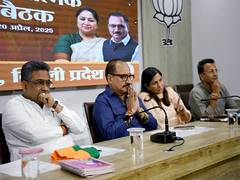Accused under PMLA can’t be sent to ED custody, Senthil Bajali’s counsel tells SC alleging abuse of the law
New Delhi [India], July 27 (ANI): The Supreme Court on Thursday was told that an accused under the Prevention of Money Laundering Act (PMLA) upon being produced before a magistrate can’t be mandatorily remanded to the custody of the Enforcement Directorate (ED) upto 15 days and can only be sent to judicial custody.
Senior advocate Kapil Sibal, appearing for Tamil Nadu Minister V Senthil Balaji and his wife, stated that on being produced before a magistrate court by the Enforcement Directorate, the accused can’t be remanded to its (ED) custody.
A bench of Justice AS Bopanna and Justice MM Sundresh was hearing pleas of Balaji and his wife challenging the Madras High Court’s judgment order which held legal his arrest by the Enforcement Directorate (ED) in the money laundering case.
Sibal pointed out the misuse and abuse of the anti-money laundering law by saying that there has been “enough use and abuse of this (PMLA).”
“Enough of this law has been used and abused” and the government have been toppled in the name of…,” he added.
Solicitor General Tushar Mehta appearing for the ED asked Sibal to “confine to the facts and not attribute motives and politicise it.”
Kapil Sibal said that the government have been toppled and asked the Solicitor General to name the people who have been arrested under the Prevention of Money Laundering Act thereby suggesting that it was only the leaders of the opposition parties being targeted under the anti-money laundering law.
Sibal underlined that the ED officers were not police officers incharge of a police station and thus they were not vested with the powers that are available to police officers incharge of a police station under the code of Criminal Procedure.
Advocate Sibal will continue his arguments next on August 2.
The Madras High Court on July 14 held legal the ED’s arrest of Balaji and subsequent judicial custody granted by a lower court on money laundering charges linked to the cash-for-jobs scam. The High Court order came on the habeas corpus petition filed by Megala, wife of Senthil Balaji.
The High Court found the habeas corpus plea not maintainable in law.
It further clarified that time spent by Balaji under medical treatment in a private hospital would be excluded from the period of custody allowed to the ED.
The ED had arrested Senthil Balaji last month in connection with the cash-for-jobs scam that occurred in the state’s transport department, and he continues to be a Minister without portfolio.
The ED had earlier approached the apex court contending that the Madras High Court erred in entertaining a habeas corpus petition filed by Balaji’s wife and allowing him to be moved to a private hospital in Chennai from the government hospital following his arrest by the ED.
After a division bench of the Madras High Court gave a split verdict on the habeas corpus plea filed by wife Balaji for his release in a case registered by ED, the Supreme Court asked the Chief Justice of the High Court to place the matter before the three-judge bench at the earliest.
The Minister for Electricity as well as Prohibition and Excise, Balaji, was arrested on June 14 and admitted to a government hospital in Chennai after he complained of chest pain. He was allowed by the Madras High Court on June 15 to be shifted to a private hospital of his choice.
He was later taken from the Tamil Nadu government Multi Super Speciality Hospital to Kauvery Hospital at Alwarpet. Doctors attending to him have recommended bypass surgery.
The interim order of the High Court was passed on a habeas corpus petition filed by the Minister’s wife, who accused probe agency officials of not having followed due procedures, such as intimating the grounds of arrest, under the Code of Criminal Procedure (CrPC).
His wife wanted the arrest itself to be declared illegal for the ED’s failure to comply with the legal procedures.
The ED had arrested Balaji in connection with an Enforcement Case Information Register (ECIR) filed under the Prevention of Money Laundering Act in 2021.
The ECIR was registered on the basis of three FIRs lodged against him by the local police in 2018 for his alleged involvement in a cash-for-job case when he was the Transport Minister in Jayalalithaa’s Cabinet in 2015.
The charges date back to his tenure as transport minister during the All India Anna Dravida Munnetra Kazhagam (AIADMK) government from 2011 to 2015.
He joined the Dravida Munnetra Kazhagam (DMK) in December 2018 and assumed office as the Electricity Minister after the party came to power in May 2021.






